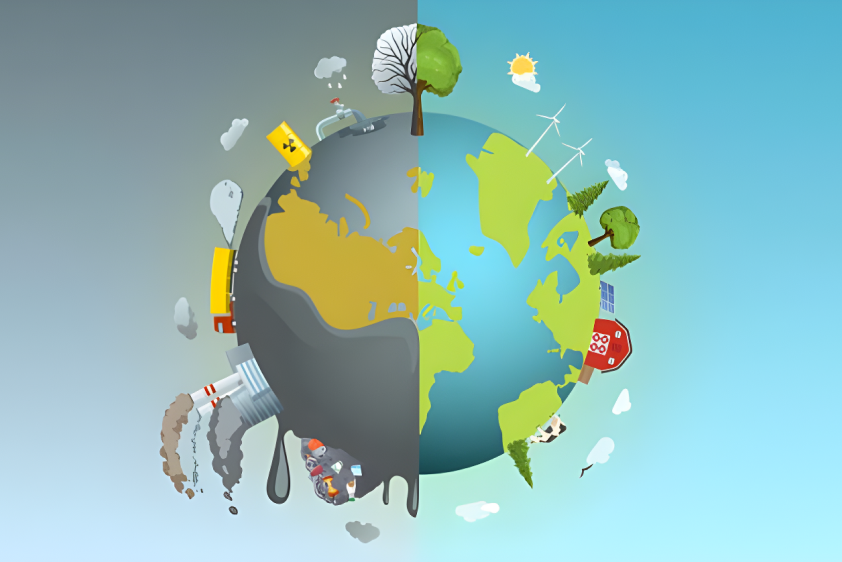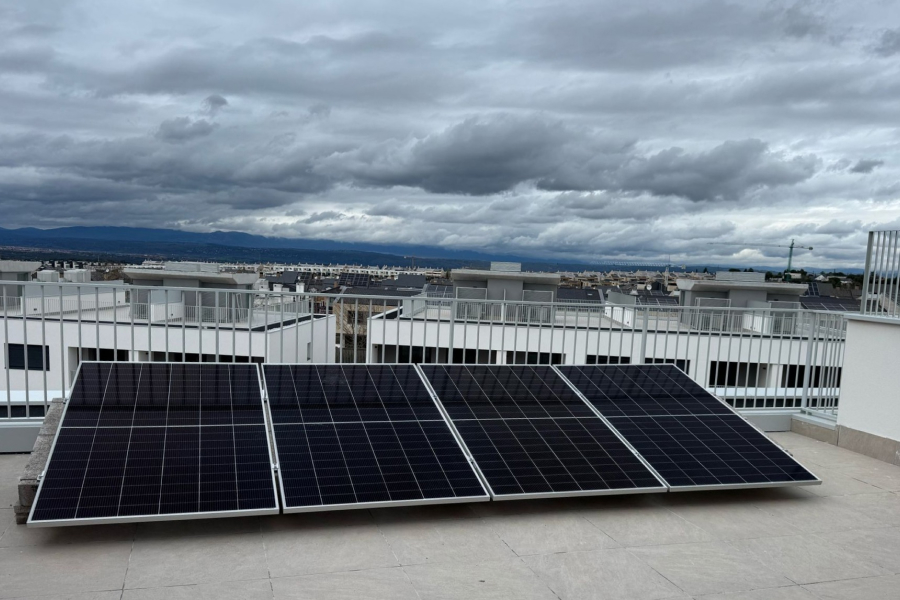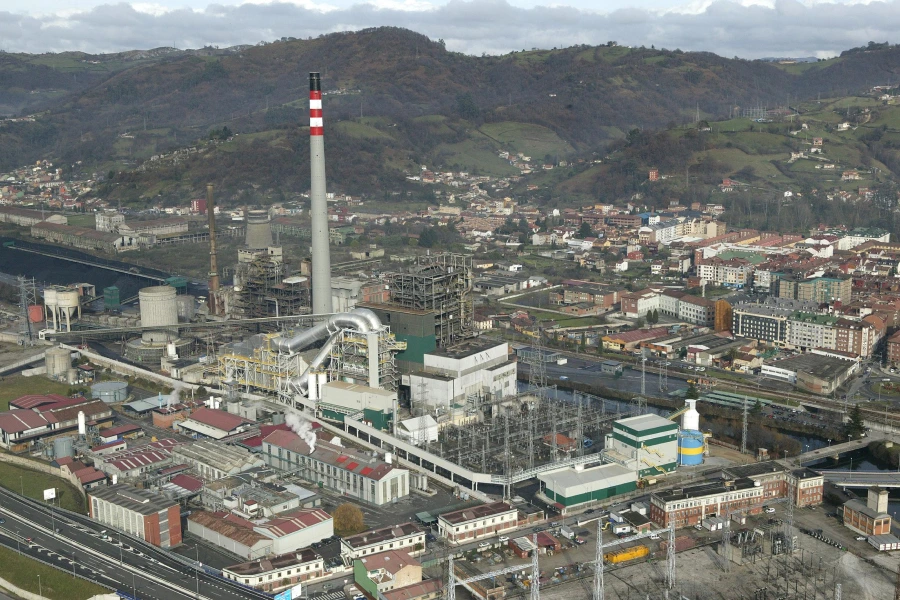DECARBONISATION IN SPAIN
The decarbonisation of Spain's economy. Find out the challenges and measures to achieve the energy transition

Decarbonisation has emerged as a key strategy to reduce carbon emissions.
What is decarbonisation?
The increase in carbon dioxide (CO2) emissions in the atmosphere – a direct consequence of the burning of fossil fuels – has triggered a series of negative effects, including the greenhouse effect, global warming and climate change. Against this backdrop, decarbonisation emerges as a fundamental strategy to reduce carbon emissions, especially CO2, in the atmosphere; and thus move towards a low-emission global economy and achieve climate neutrality. This process requires a structural change to continue to grow without the dependence on carbon in energy production, which is achieved through the energy transition towards alternative and clean energy sources that emit only what the planet can absorb.
To successfully decarbonise the economy, comprehensive and coordinated measures are needed to address both energy supply and demand. This implies promoting energy efficiency, encouraging investment in clean technologies and facilitating the adaptation of industries and workers to a new economic paradigm. In this context, collaboration and cooperation between different sectors is key to drive a significant and sustainable shift towards a low-carbon and climate-resilient economy.
Decarbonisation data and context in Spain
Spain's firm commitment to move away from the use of fossil fuels and ensure a solid energy transition has led to a marked increase in the generation of energy from renewable sources. This drive is underpinned by the country's competitive advantage over other European nations, thanks to its abundant renewable resources and vast available areas. According to a joint study by the Basque Centre for Climate Change (BC3) and the Observatory for Energy Transition and Climate Action (OTEA), the boom in renewable energies in Spain resulted in the year 2023 closing with a historic low in greenhouse gas emissions: 271.6 million tonnes of CO2,¡ – 7.5% less than the previous year. This milestone marks a significant step forward in the process of decarbonisation of the Spanish economy and in the fight against climate change.
Projections for the coming years indicate that greenhouse gas emissions in Spain will reach a record low since the beginning of the historical series in 1990 – even below the levels recorded in 2020, when they fell by 12% due to mobility restrictions and reduced economic activity during the pandemic. At that time, emissions were also below 1990 levels for the first time, falling by 5.6%.
Despite the notable progress made in Spain in the field of renewable energies, it is essential to act on the demand side, promoting the electrification of consumption, as well as increasing the capacity of electricity grids. Electrification, together with the development of storage systems and an efficient transmission and distribution grid, would make it possible to harness the advantages of renewables and the industrial opportunity that the energy transition represents, attracting industry and making the current industry more competitive.
In addition, the country has committed to reducing its greenhouse gas emissions in line with the goals of the Paris Agreement, which aims to limit global warming to 1.5°C compared to pre-industrial levels. The main goal is to achieve carbon neutrality by 2050, which implies reducing net greenhouse gas emissions to zero. To achieve these goals, Spain has designed the National Integrated Energy and Climate Plan (PNIEC) 2021-2030, which establishes that 81% of electricity generated should come from renewable energies, and that these should account for 48% of final energy consumption. While the plan initially sought to reduce greenhouse gas (GHG) emissions by 23% by 2030 compared to 1990, its update raises the figure even more: to 32%.
Thermal decarbonisation
Thermal energy demand in Spain continues to account for 40% of final demand, which is split roughly equally between industry (where more than 80% comes from heat production and 20% from process emissions) and heating and cooling needs in buildings, including the residential and tertiary sector.
Despite the progress made in reducing carbon emissions, the current pace of progress is not sufficient to meet the climate commitments set. Against a backdrop where accelerating decarbonisation faces a number of barriers common to all sectors, along with significant differences between them – both challenges and opportunities arise, both in economic terms and for the progress of the process itself. Thus, a significant acceleration is needed to stay on the path of not exceeding a 1.5°C average global temperature increase by the end of the century.
What is Q-Cero Alliance, united for thermal decarbonisation in Spain?
It is against this backdrop that Q-Cero, an alliance dedicated to accelerating the decarbonisation of thermal demand in industry and buildings in Spain, has emerged. Its objective is to promote concrete and effective measures to reduce dependence on energy sources with high carbon emissions; thus contributing significantly to the mitigation of climate change and compliance with the decarbonisation objectives established at national and international level.
The initiative, open to all stakeholders, aims to establish a space for collaboration and dialogue to accelerate the transition to a low-carbon economy, with a special focus on thermal energy users, both in the industrial sector and in buildings.
This alliance, which is supported by the Centre for Innovation in Technology for Human Development of the Polytechnic University of Madrid, has achieved the active participation of more than forty companies and organisations, including Iberdrola España. In this way, the project is aligned with the efforts of the European Union in the fight against climate change, which aims for all member countries to reduce their greenhouse gas emissions by at least 55% by 2030. Thus, the Q-Cero Alliance is positioned as a key catalyst to promote concrete and collaborative actions leading to a more sustainable economy.
Q-Cero Alliance Objectives
With the mission of accelerating the decarbonisation of thermal demand in industry and buildings in Spain, the Q-Cero Alliance presents numerous objectives, in a work horizon with a special focus on the next two years:
- To be a meeting point with special emphasis on the needs of thermal energy users.
- To provide clarity on the current situation, as well as progress, barriers and solutions for the decarbonisation of heat needs in different sectors and processes.
- Drive actions, create spaces for dialogue and amplify messages to accelerate the decarbonisation of thermal energy and realise economic and social opportunities.
Courses of action of the Q-Cero Alliance
In this way, the alliance for the decarbonisation of thermal demand in Spain proposes different potential activities or courses of action:
-
Creation of dialogue forums.
-
Securing public funding and support for the decarbonisation of heat.
-
Facilitate exchange between value chain actors.
-
Communication and dissemination of the current situation, progress made and solutions.
-
Promoting the development of processes to eliminate or reduce decarbonisation barriers.
-
Promoting the development and scaling up of available technological solutions and development projects the so-called "hard to abate" processes.
-
Support to different actors (e.g. information, tools, etc.)
-
Boosting the development of skills and workforce requirements: training and employment.
Measures to reduce decarbonisation in Spain
The search for effective measures to reduce decarbonisation in Spain has become a key priority in the context of global challenges related to climate change and the transition towards a more sustainable energy model. In a world increasingly aware of the negative impacts of carbon emissions on the environment and society, Spain is at a crucial point in its path towards decarbonisation. This process implies the adoption of principles and regulatory actions that contribute to the creation of a sustainable and efficient framework to combat climate change:
-
Continuing to make progress of renewable energies: Encourage the installation and expansion of renewable energy sources, such as solar, wind energy and hydroelectric, to reduce dependence on fossil fuels.
-
Electricity grids development and digitalisation: Upgrade and modernise electricity grids to facilitate the integration of renewables, advance the electrification of demand and seize the industrial opportunity of the energy transition. This requires securing investments as well as flexible network planning, including up-front investments.
-
Advance electricity storage, with measures and regulatory frameworks that make it possible (streamlining procedures and an appropriate remuneration framework).
-
Promoting measures that enable progress in the decarbonisation of industry (in particular industrial heat), such as tax measures, aid and, of course, guaranteeing its connection to the grid.
-
Promoting energy efficiency: Implement policies and programmes to improve energy efficiency in industrial, commercial and residential sectors, thereby reducing carbon emissions.
-
Transition to sustainable mobility and consumption: Promote the use of electric vehicles, as well as public transport. All this to reduce greenhouse gas emissions in the transport sector. This requires purchase aid, tax measures and simplification of procedures.
-
Regulatory and policy implementation: Establish regulations and policies that limit carbon emissions, encourage the decarbonisation of key sectors such as industry and agriculture, and promote the adoption of clean technologies and sustainable practices. In particular, uniform taxation under the "polluter pays" principle.





